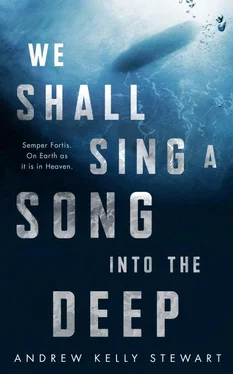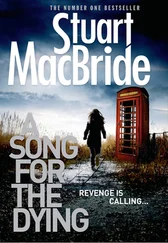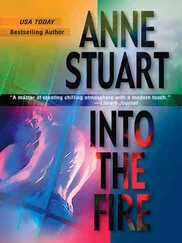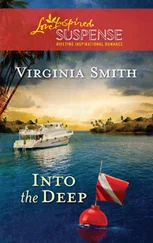I shouldn’t be here. It was risky enough, slipping away once. It’s one thing if Ephraim noticed—he would not go to Caplain Marston. But St. John certainly would.
Still, it is too important.
The prisoner stirs. Moves sluggishly.
“Ah, the little bird returns to my window,” Adolphine says. Maybe an attempt at humor, but a weak one. Weak, strained like her voice. I slip through the gap in the grating a slender slice of fish cake.
When she realizes what it is, she takes it from my fingers quickly. I hear her chew, savor it.
Then I snake the water tube up.
“Thank you, child,” she says after taking a long drink, relieved, some of her energy renewed.
“I’ve never heard someone talk like you. Sometimes, when new kids join us, they have all kinds of different ways of speaking. Different shades of skin. Do they speak that way on Guam?” I ask.
“I am not from Guam. I was born on an island in the Caribbean called Martinique. The Caribbean…”
“I have seen charts for those islands,” I say. “Caplain Amita showed them to me.”
“After the war, my family was evacuated to Panama due to radiation from the Cuba strike. And then my parents joined the American armed services—we heard that there was food and opportunity for those who served. Both my father and my mother were soon engaged in the Pacific fleet, which was based in Guam, and they brought me along.”
“You have brothers and sisters?”
“Three…” she answers. “Three brothers.”
“Are they alive?”
“One is. He’s stationed at Base Darwin, in Australia. One was killed in the battle of Oceania, just last year. The other died when I was very young. Typhus. Child,” she says, after a pause. “Why are you asking me these questions?”
“They let women serve… they let women serve with men on your boat?”
“They do. There was a time, before the war, when they did not. But now, every person must serve. In order to survive.”
A woman.
I still cannot believe it.
I cannot remember ever speaking with a woman.
“My name is Remy,” I tell her. “It isn’t the name I was born with. All those brought aboard, we were given different names. Sacred names.”
It feels like a confession of my sins, divulging all of this. As though she is playing the role of confessor. The role Caplain Amita often played for me.
Adolphine doesn’t respond for a time; I hear her shift. I think she is lying down, curled, for there is no room to lie flat in those tight quarters. She presses her face against the grate, like last time. I see one eye in this dimness, looking down at me through the mass of exposed wiring, big, honey-colored, and red-veined.
“Remy, I think you will get in trouble if you are found speaking with me,” she says, sober, tired.
“I need for you to tell me about the war,” I say. “And what it’s like Topside. What year is it?”
Adolphine takes in a deep breath. “The year is 1986. There have been two wars, really…” she says, after a moment, her voice, high, but also thick. “The first came in 1963. Not many records survived the first war, but we’ve been able to piece together most of the chain of events, especially thanks to Calvert. Your captain, Amita, was a chaplain in the US Navy, and he, along with an executive officer named Crockett, led a group of about thirty other crewmembers in a mutiny against the captain of this submarine. They felt that war against the Reds…”
“Reds?”
“The Russians… the enemy of the United States—of America. These two countries were almost at war before, you see… it was called the Cuban Missile Crisis. Everyone had missiles pointed at each other on the land as well. They thought the Reds were in league with the Devil. That this was the great war, good versus evil. Their mutiny was quick, bloody. Crockett was injured, eventually died from his wounds, but not before he launched all the nukes—except one, which malfunctioned. Calvert was one of those original members.”
The elders.
“They forced the rest to join or die—many stayed. Those who didn’t were thrown into the sea.” She pauses—footsteps crossing above. The grease wick quavers in my hand. When the guard passes, Adolphine continues: “Seems like Crockett’s plan was to catch the Reds by surprise. It worked. He hit a number of key air bases and other essential Russian military infrastructure.
“America then had no choice but to follow through with the attack once it began, and for that reason, in the first wave of the war, Russia and the rest of the USSR was hit hardest. America was mostly spared, except for a few cities and bases, while other countries in Europe were in closer range to the SSRs. They soaked up most of the retaliation.
“It was a long war. Two years, it raged on. The Reds weren’t down and out—found a way to get a squad of their bombers through. Took out our defenses. Launched the last of their missiles. That’s when America got hit good. Starvation followed. Civil unrest. Different factions battled each other, in America, but also in Russia, in Europe. That was pretty much the end of the first war.
“Worst was the radiation poisoning. Most of the people who died in the war died from that.”
That I know about. The blue poison.
I see in my mind the Demi, young Bartholomew. A skeleton.
I think of Lazlo.
It doesn’t take long for the poison to kill you. To eat you up.
“How many died?” I ask.
Silence again. For a moment.
“No one really knows—estimates are somewhere between one and one and half billion… about half the population of the world, some think. Places here in the South Pacific didn’t get the worst of it. Japan, the Hawaiian Islands were hit because they were strategic bases… but the wind patterns didn’t deposit the fallout this far south—and over the years, it dissipated. That’s why places like Australia, New Zealand, Malaysia, Papua New Guinea, and Guam survived. That’s why I survived.”
“What about the second war?”
“After the fall of the American military command, Australia became the center for the fight against the Reds. Though the Russians were worse off than the US, there were still skirmishes between their remaining forces and US forces in the Pacific. The Chinese, meanwhile, had managed to keep out of most of the war until then—they forced the Russians to hand over their remaining tanks and ordnance, and then used them to aggressively absorb countries like Vietnam, Korea, Thailand, and Laos. All under the flag of communism.”
“What is a communism?”
“A communist is someone with a much different perspective than ours. A system where the people should be the ones who have the power, but, in reality, it’s the person in charge who calls the shots. So, in so many ways, it became the same old fight just with different players.”
“But you said the other day that peace was at hand,” I say.
She pauses. “It is. The Coalition lost the Philippine islands just weeks ago—there was a key base there—to the Eastern Asian Alliance Navy—they call themselves the Liánméng. It won’t be long until Australia stands down. Guam will probably do the same.” An edge of bitterness. “But the war will be done, finally. Everyone is tired of it.”
I hear the exhaustion. The defeat.
“Are your parents alive?” I ask.
This seems to take her off guard. “No. They both died of cancer, a few years ago. They were sent out on rescue missions—trying to move people out of the contaminated zones in Japan. They were exposed.”
“I’m sorry.”
Poison. Always the poison that kills.
I say, “You mentioned that my parents were probably from Guam—stationed in Guam, like yours. Do… do you think you knew my parents? What happened to them?”
Читать дальше











